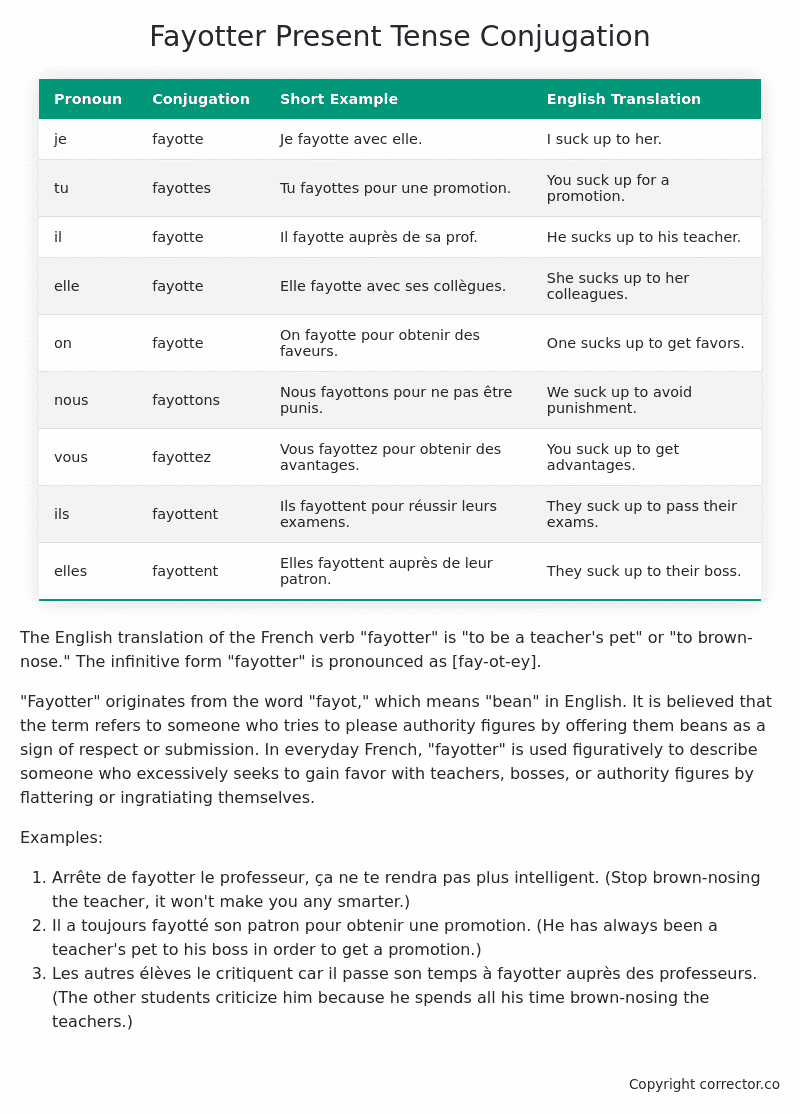Le Present (Present Tense) Conjugation of the French Verb fayotter
Introduction to the verb fayotter
The English translation of the French verb “fayotter” is “to be a teacher’s pet” or “to brown-nose.” The infinitive form “fayotter” is pronounced as [fay-ot-ey].
“Fayotter” originates from the word “fayot,” which means “bean” in English. It is believed that the term refers to someone who tries to please authority figures by offering them beans as a sign of respect or submission. In everyday French, “fayotter” is used figuratively to describe someone who excessively seeks to gain favor with teachers, bosses, or authority figures by flattering or ingratiating themselves.
Examples:
- Arrête de fayotter le professeur, ça ne te rendra pas plus intelligent. (Stop brown-nosing the teacher, it won’t make you any smarter.)
- Il a toujours fayotté son patron pour obtenir une promotion. (He has always been a teacher’s pet to his boss in order to get a promotion.)
- Les autres élèves le critiquent car il passe son temps à fayotter auprès des professeurs. (The other students criticize him because he spends all his time brown-nosing the teachers.)
Fayotter – About the French Present Tense
To take a deep dive into all the French tenses then see our article on Mastering French Tense Conjugation.
Common Everyday Usage Patterns For Le Present
Interactions with Other Tenses
Table of the Present Tense Conjugation of fayotter
| Pronoun | Conjugation | Short Example | English Translation |
|---|---|---|---|
| je | fayotte | Je fayotte avec elle. | I suck up to her. |
| tu | fayottes | Tu fayottes pour une promotion. | You suck up for a promotion. |
| il | fayotte | Il fayotte auprès de sa prof. | He sucks up to his teacher. |
| elle | fayotte | Elle fayotte avec ses collègues. | She sucks up to her colleagues. |
| on | fayotte | On fayotte pour obtenir des faveurs. | One sucks up to get favors. |
| nous | fayottons | Nous fayottons pour ne pas être punis. | We suck up to avoid punishment. |
| vous | fayottez | Vous fayottez pour obtenir des avantages. | You suck up to get advantages. |
| ils | fayottent | Ils fayottent pour réussir leurs examens. | They suck up to pass their exams. |
| elles | fayottent | Elles fayottent auprès de leur patron. | They suck up to their boss. |
Other Conjugations for Fayotter.
Le Present (Present Tense) Conjugation of the French Verb fayotter (You’re reading it right now!)
Imparfait (Imperfect) Tense Conjugation of the French Verb fayotter
Passé Simple (Simple Past) Tense Conjugation of the French Verb fayotter
Passé Composé (Present Perfect) Tense Conjugation of the French Verb fayotter
Futur Simple (Simple Future) Tense Conjugation of the French Verb fayotter
Futur Proche (Near Future) Tense Conjugation of the French Verb fayotter
Plus-que-parfait (Pluperfect) Tense Conjugation of the French Verb fayotter
Passé Antérieur (Past Anterior) Tense Conjugation of the French Verb fayotter
Futur Antérieur (Future Anterior) Tense Conjugation of the French Verb fayotter
Subjonctif Présent (Subjunctive Present) Tense Conjugation of the French Verb fayotter
Subjonctif Passé (Subjunctive Past) Tense Conjugation of the French Verb fayotter
Subjonctif Imparfait (Subjunctive Imperfect) Tense Conjugation of the French Verb fayotter
Subjonctif Plus-que-parfait (Subjunctive Pluperfect) Tense Conjugation of the French Verb fayotter
Conditionnel Présent (Conditional Present) Tense Conjugation of the French Verb fayotter
Conditionnel Passé (Conditional Past) Tense Conjugation of the French Verb fayotter
Conditionnel Passé II (Conditional Past II) Tense Conjugation of the French Verb fayotter
L’impératif Présent (Imperative Present) Tense Conjugation of the French Verb fayotter
L’impératif Passé (Imperative Past) Tense Conjugation of the French Verb fayotter
L’infinitif Présent (Infinitive Present) Tense Conjugation of the French Verb fayotter
L’infinitif Passé (Infinitive Past) Tense Conjugation of the French Verb fayotter
Le Participe Présent (Present Participle) Tense Conjugation of the French Verb fayotter
Le Participe Passé (Past Participle) Tense Conjugation of the French Verb fayotter
Struggling with French verbs or the language in general? Why not use our free French Grammar Checker – no registration required!
Get a FREE Download Study Sheet of this Conjugation 🔥
Simply right click the image below, click “save image” and get your free reference for the fayotter present tense conjugation!

I hope you enjoyed this article on the verb fayotter. Still in a learning mood? Check out another TOTALLY random French verb present conjugation!


